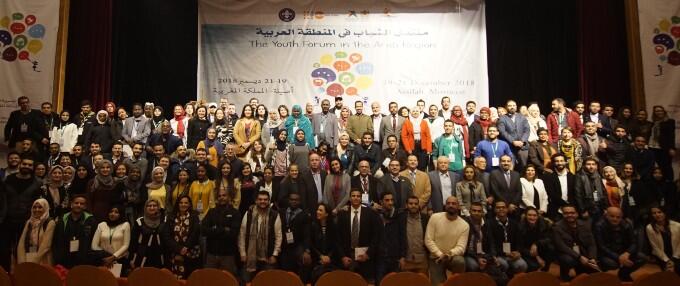Dr. Luay Shabaneh, UNFPA Director for the Arab Region,
Last week, the Arab Youth Forum, held in Asilah, Morocco, ended with a clear message on the need to recognize the positive role of youth, to integrate them in various fields in life, the need to change public perceptions about them, and to provide public spaces for dialogue between young people and policy-makers, as the only way for Arab societies to flourish with the contributions of its youth. Participants in the forum organized by UNFPA, the United Nations agency for reproductive rights, with the Mediterranean Youth Forum in Morocco and the World Organization of the Scout Movement (WOSM), recommended a new focus on the role of people under 30 years old such as finding a new approach and narrative on youth; using innovative ways to service young people and their causes; and working on youth, peace and security. Such recommendations, if taken seriously, will inevitably accelerate development and the advancement of Arab States.
Over the last few years, various studies highlighted the frustration that young people in the Arab region felt. Unemployment is reportedly a major cause for a feeling of uncertainty towards the future, and a strong motive for migration, regardless of the costs, even on board unsafe boats. Young people have regularly said that they felt sidelined and ignored by policy-makers, which is particularly frustrating given how it was primarily young men and women who took the streets in 2011 with clear demands for equity.
While governments seek to preserve security, those under 30, who represent more than half the Arab population, want to be taken seriously as a driving force that can positively contribute to the advancement of their countries. However, when such force is excluded, it can turn into rage that is hard to control, and confrontations can get out of control between the youth and those they see as representing authority.
Let us take a step back and look at the root causes of the problem: why do so many people work in precarious and informal jobs that lack healthcare coverage or social benefits, according to the International Labor Organization’s (ILO) report issued in 2018? Why does the Arab region suffer the highest unemployment rate-close to the 30% mark? Why do 42% of young people work in jobs requiring lower education standards than what they have? Why did half the youth of the region express mistrust in their governments’ ability to face unemployment?
Some 200 young men and women from 20 Arab states debated these questions in sessions that also included cabinet ministers, officials, researchers, youth movements leaders, artists and intellectuals. Discussions looked at how the youth envisioned their lives, roles, and future, and how they wanted their governments to include their voices rather than exclude them from the public sphere. Young people saw all strategies for development, labor, and the economy should be centered around their right to participate. They asked for quality healthcare and education to prepare them to play a central, not a secondary, role in decision-making. Why not? UNSC’s resolution 2250/2015 about the role of youth in peace and security is built around the participation of the youth in these areas, and the need to increase their representation in decision-making processes related to conflict resolution and prevention.
Once again, the light of young men and women shined in a conference that sought to promote their role. I was astonished with their proposals on small projects, innovative solutions to everyday problems, and rigorous studies about governance and participatory approaches to decision-making. Based on the discussions, and as a commitment from UNFPA to the youth of the Arab States region, we, as an organization, adopted a regional framework that we will roll out in 2019, in collaboration with Arab, European, and African youth organizations, in order to provide a space within which the youth will feel safe. We will support them, as an organization, in moving their ideas forward and developing them into plans that governments can adopt.
The road in long in the Arab region, but is broad enough to accommodate initiatives that seek change. If the governments show enough their political will, and if the young people are responsible enough to want to build. I remembered the expression of “meeting halfway”, a place that those who participated in the conference want to preserve, to convince politicians to open spaces for the youth, and to convince the youth that their voice really counts. The forum forged a space where the youth, officials, intellectuals, artists, and thinkers can discuss in all transparency how to reach a social contract with clearly defined mandates and responsibilities, within a framework of accountability and good governance.
Let us count the priorities ahead: governments must understand the demands of the youth and review their positions to absorb them; governments need to take positions that are more rights-centered and that invest more in the youth. On the other hand, the young people should be more open to shoulder the responsibility, go through constructive processes seeking a realistic change. These priorities are set within the regional framework launched by UNFPA in Morocco, as a way to promote the positive role of the youth as part of the solution, not the problem facing governments. Radical change needs practical decisions, the foremost of which is recognizing that the region is going through a rough stage, and that its youth should be a strong force for change, not a raging fire of trouble.


